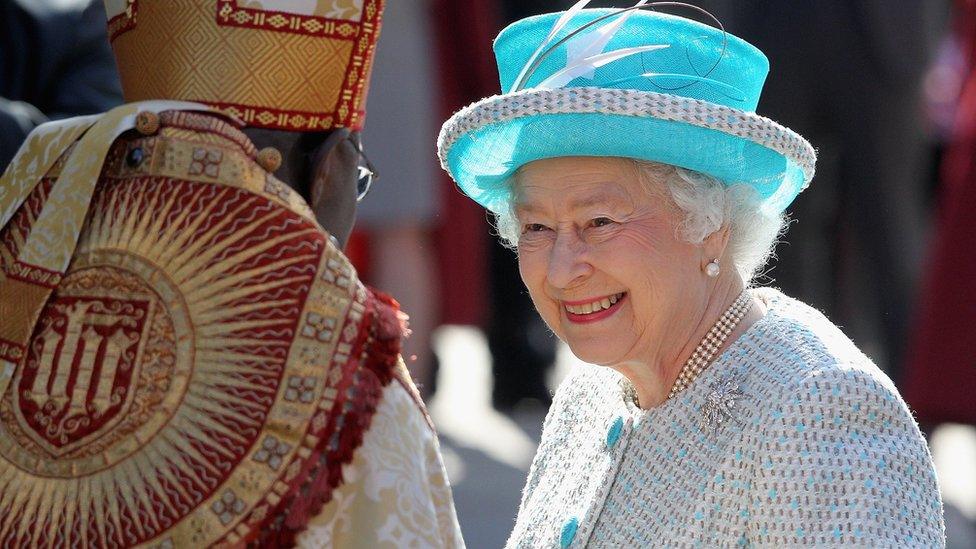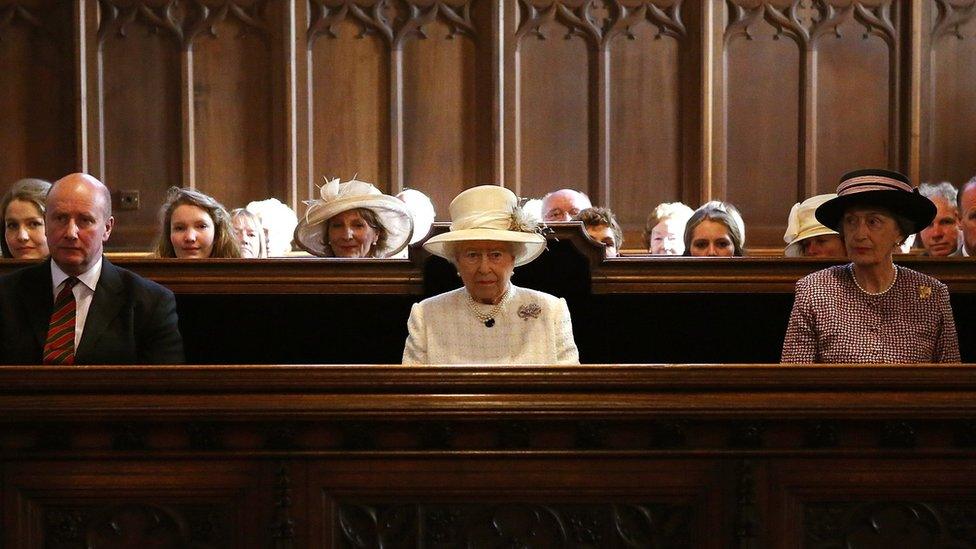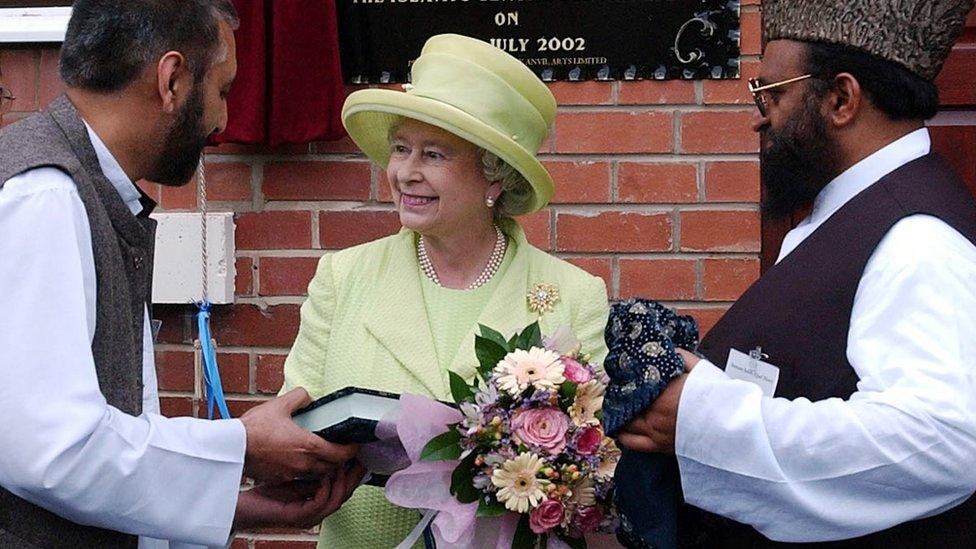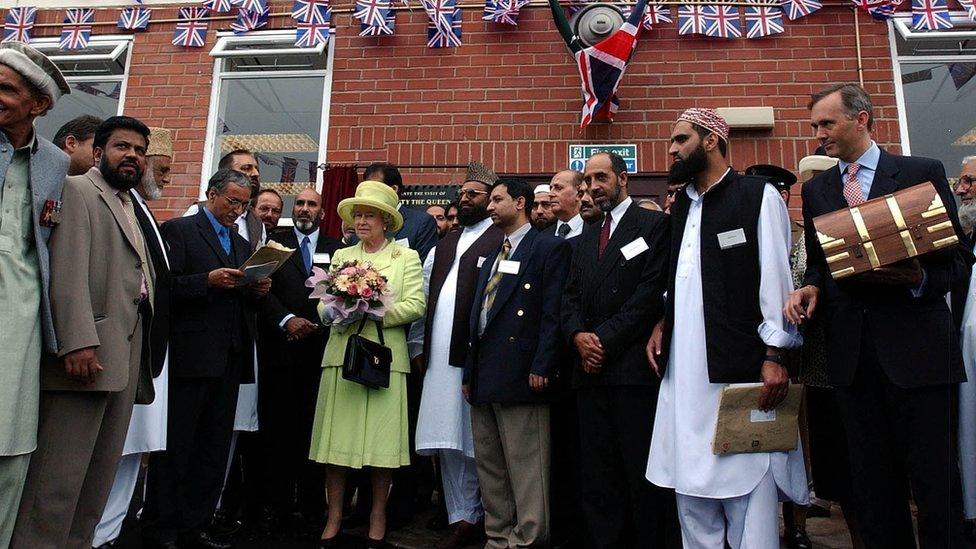How the Queen's Christian faith went beyond duty
- Published

The former Archbishop of York, Lord John Sentamu says the Queen had a formidable knowledge of hymns, psalms and scripture
Almost every aspect of official ceremony surrounding the death of the Queen has been steeped in religious significance.
But accounts from those close to Elizabeth II emphatically suggest that to her, faith went far beyond protocol and duty.
It shaped and guided her throughout her life in a way the public only started to appreciate later in her reign.
"I think there have been only two Sundays since I've been here - apart from Covid times - that she didn't come to church," says Kenneth MacKenzie, who for 15 years was domestic chaplain to the Queen when she was at Balmoral.
In the months each year the late Queen was in Scotland, she would attend the little parish church of Crathie Kirk where she would sit in a pew to one side, upholstered in purple velvet.
While one of her constitutional titles was Supreme Governor of the Church of England, this church she attended so regularly was Presbyterian.
Mr MacKenzie felt that might have allowed the Queen to feel she could go more as a member of the congregation, rather than as a figure of authority.
He says the Queen spoke to him about the strong faith of her grandfather and the hymns her father, George VI, would sing to her at bedtime when she was a child.

The Queen at a commemoration service at Crathie Kirk church in 2014
"The moments I'll cherish most would be those when the Queen would speak to me as a parish minister about things happening in the world," he says.
It quickly became clear to him she was not only devout, but that she felt strongly that her role had been divinely assigned.
"I knew she felt a calling in some way from her people, but more than that, she saw her calling as from almighty God," he says.
Mr MacKenzie is travelling to Windsor to take part in the final service before the Queen's burial.
One of the small group of people involved in drawing up the order of service for the Queen's funeral at Westminster Abbey was the former Archbishop of York, Lord John Sentamu.
He recalls many happy moments in the company of the Queen, but also her formidable knowledge of hymns, psalms and scripture.
"Woe betide you if you were a preacher and you misquoted," Lord Sentamu says. "The Queen would graciously say, 'Were you meaning to say this?' or 'Were you in the right book?'"
The former archbishop says the Queen committed to memory the words of most popular hymns - "except the dreary ones"- and she frequently quoted psalms. He says it was very clear to him that her faith guided her.
Since 2000 - which was seen as a turning point in how freely she started to talk about her faith - the Queen gave us increasing insight into that side of her character, once a year, in her Christmas broadcasts.
Those speeches also provided her an opportunity to set out a broader vision.
"Christ's example has taught me to seek to respect and value all people of whatever faith or none," the Queen said in one Christmas message.
It was a theme she would often return to, most notably in a speech at Lambeth Palace in 2012 where she said the Church of England "has a duty to protect the free practice of all faiths in this country".
It was a message warmly welcomed by Afzal Khan who, in 2002, presented the Queen with a Quran when she became the first monarch to visit a British mosque, after she accepted an invitation from Scunthorpe's Islamic Centre.
"It was in the months after the 9/11 attacks and we were suffering," Mr Khan says. "We (Muslims) were frightened and needed support from someone to tell us we are part of British society too. That support came in the form of the Queen.
"After her visit, we felt like it didn't matter if anybody called us terrorists. We were still British."

In 1994, the then Prince Charles had famously expressed a desire to be 'Defender of Faith' rather than 'Defender of the Faith'. It came years later, but a progressively more outwardly looking Queen, adapting to a rapidly changing society, eventually expressed similar sentiments. She visited more temples, gurdwaras and synagogues.
Chief Rabbi Ephraim Mirvis said it was clear through all his meetings with the Queen, including the time he accompanied her to the Nazi concentration camp at Bergen Belsen in Germany, that her interest in his faith went far beyond duty.
"I could see the extent of her connection with Jews and Judaism and her concern for the safety of Jews," Rabbi Mirvis says.
He talked of how she asked searching questions that showed an appetite for discussion around faith.
Lord John Sentamu is one of many who suggest the Queen was herself an effective preacher and evangelist.
He says the Queen was so immersed in scripture she would "just evangelise naturally".
"She often used scripture as a way of comforting and reassuring," he says.
Look back through her speeches of recent years, particularly through the pandemic, and you will see the way she drew on her faith even to counsel those facing loss.
In the words of the Queen's Easter message as the pandemic first raged, she referred to the Easter story when she said: "As dark as death can be - particularly for those suffering with grief - light and life are greater."


Related topics
- Published9 September 2022
